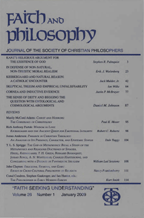 | |
| Discipline | |
|---|---|
| Language | English |
| Edited by | Jonathan L. Kvanvig |
| Publication details | |
| History | 1984–present |
| Publisher | Society of Christian Philosophers (United States) |
| Frequency | Quarterly |
| Standard abbreviations | |
| ISO 4 | Faith Philos. |
| Indexing | |
| ISSN | 0739-7046 (print) 2153-3393 (web) |
| LCCN | 96648356 |
| OCLC no. | 9801750 |
| Links | |
Faith and Philosophy is a peer-reviewed academic journal published by the Society of Christian Philosophers with support from Asbury Theological Seminary and the University of Arkansas. It is currently edited by Jonathan L. Kvanvig. The journal aims to foster the philosophical examination of religion and Christian faith. In accordance with the goals of the society, Faith and Philosophy seeks to contribute to the continuing effort of the Christian community to articulate its faith in a way that will withstand critical examination, and to explore the implications of that faith for all aspects of human life. In 2019, the quarterly journal became a free open-access online publication and ceased both physical publication and online publication behind a pay wall. The journal's website is faithandphilosophy.com.